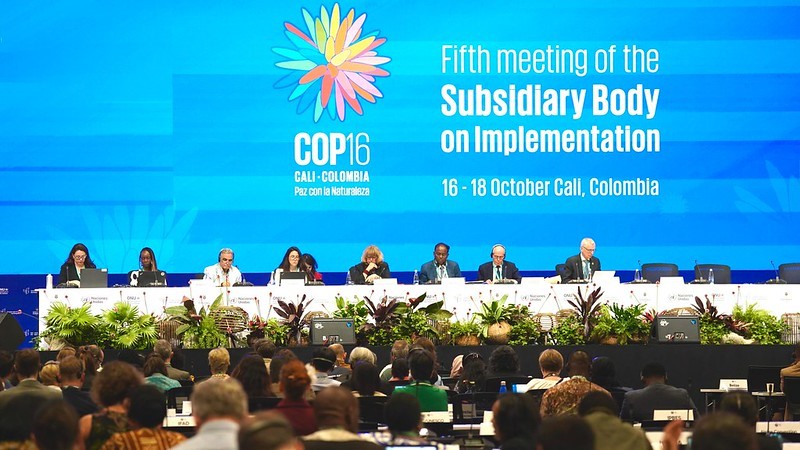The NGO will actively participate in the COP16 from October 21 to November 1, 2024. The 16th Conference of the Parties to the Convention on Biological Diversity will take place in the city of Cali, Colombia.
On the occasion of World Wildlife Conservation DaySEO/BirdLife announces its presence at the next Conference of the Parties to the Convention on Biological Diversity (COP16) which is celebrated from next Monday to November 1 in Cali, Colombia.
Asunción Ruiz, Executive Director of the organization, emphasizes the importance of international agreements as the only viable path to address global challenges: “The climate crisis and biodiversity loss can only be solved through a solid international commitment. There is an urgent need for a United Nations global framework for biodiversity. Guarantee the human right to a clean environmenthealthy and sustainable must be central to all decisions made in this regard COP16. “Environmental justice ensures social equality and is the way to contribute to world peace.”

The NGO is part of the BirdLife International delegation, made up of 70 experts from more than 120 countries, to promote ambitious agreements that will protection of global biodiversity and strengthen the fight against the climate crisis.
In this COP16Environmental NGOs urge governments to take urgent action to halt and reverse nature’s loss biodiversity. According to the environmental organization, the The biodiversity crisis is as critical as that of climate change and to reverse its consequences, concrete measures and actions must be taken COP16 decisive in this sense.

Juan Carlos Atienza, Head of Environmental Governance at the NGO, emphasizes the importance of immediate action: “We are facing a global biodiversity crisis of enormous proportions, which will have consequences for humanity comparable to those of climate change. We’re running out of time to actand that’s what we need COP16 Bold decisions are being made to ensure implementation of the Global Biodiversity Framework.
Priorities at COP16
The organization will work with governments at the summit to strengthen their commitments and take the following key actions:
- Conservation of species: Species are the fundamental foundation on which ecosystems are built. It is crucial that technical and financial support structures are put in place to help countries meet their species conservation and recovery obligations. Active cooperation between the parties and the creation of a framework that enables scientific and technical action are required.
- Protecting important spaces for biodiversity: The quantity of protected areas is important, but their quality is also crucial. Parties should integrate Key Biodiversity Areas (KBAs) into their National Biodiversity Plans (NBSAPs) and disaggregate global indicators to ensure that key sites for nature are effectively protected. Currently, only 13 countries have included these indicators in their plans.
- Synergy between biodiversity and climate: The climate crisis cannot be tackled without simultaneously tackling biodiversity loss. COP16 should encourage greater cooperation between biodiversity policies and climate change actions, and promote nature-based solutions that strengthen both objectives.
- Implementation and updating of national plans: Countries should commit to urgently update their National Biodiversity Plans (NBSAP) and submit their national targets before COP16, to ensure that global promises are translated into concrete actions. Currently, only a third of countries have presented their national targets. Spain is one of them, but significant improvements are needed, because neither the autonomous communities (which in Spain are the authorities responsible for the conservation of biodiversity) nor some ministries responsible for policies that preserve biodiversity are involved destroy. .
- Supervision and accountabilityIt is essential that the Parties finalize the GBF monitoring framework, allowing for a comprehensive assessment of progress in a coherent manner. Furthermore, it is essential that countries report their progress against disaggregated key indicators to ensure effective monitoring of implementation.
- Resource mobilizationIt is imperative to mobilize at least $20 billion annually from developed countries to developing countries by 2025, and $30 billion by 2030, with the aim of financing biodiversity conservation. Funding commitments must be delivered quickly and transparently, especially through the Global Biodiversity Framework Fund (GEF).
- Rights of indigenous peoples and other rights holdersWe urge Parties to strengthen the rights and leadership of indigenous peoples and other local communities, through decisions at COP16 that ensure accountability mechanisms and direct financing for them, as referred to in Article 8j of the Convention on Biological Diversity.
- Integration of biodiversity into sectoral policy: Parties should take decisions that ensure the integration of the objectives of the Global Biodiversity Framework into key sectoral policies, such as climate change, health, food, agriculture, forestry, fisheries, infrastructure, mining, energy and finance, thus driving transformative change towards promote a sustainable economy. development model.
BirdLife International’s delegation to COP16 will ensure that parties take ambitious decisions and respond to the urgency to protect biodiversitymobilize the resources necessary to achieve the goals of the Global Biodiversity Framework and strengthen the rights of indigenous peoples.

